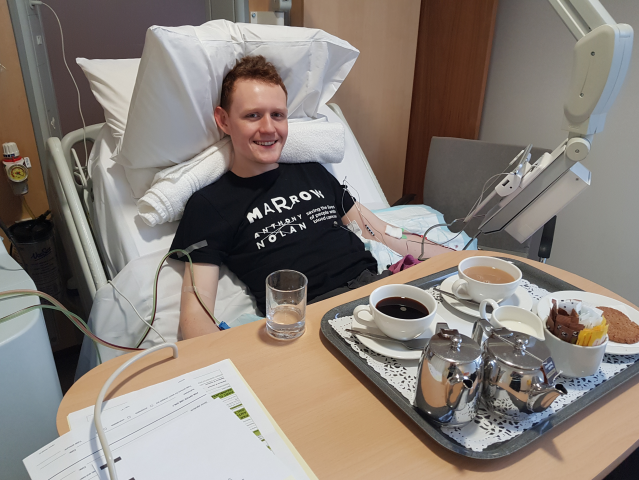How Covid-19 has disrupted efforts to care for blood cancer patients
Charities such as Anthony Nolan, which assist blood cancer patients with finding a stem cell match, have suffered from a lack of funding during the pandemic, leaving critically ill people at risk

On the day of his Year 10 school prom, as other students excitedly prepared for the big occasion, then 15-year-old Rian Harvey was sat in a ward of Royal Marsden Hospital, awaiting the stem cell transplant that would save his life after a leukaemia relapse.
Despite the hot weather on that day back in July 2015, his hospital room windows had to remain sealed shut, as even the smallest bug bite could have killed him due to his compromised immune system.
Six years on, he finds himself grateful that he relapsed when he did, with five years to build his immunity before the Covid-19 pandemic hit.
Blood cancer patients are one of the most vulnerable groups of people at risk of Covid-19, according to research, being 57 per cent more likely to suffer severe disease compared to other cancer patients.
Recalling his own experience, Rian, now 22, says: “It’s scary, you look at everything that person has gone through, they had blood cancer and then had a stem cell transplant, they have gone through all the stress of only to be taken by a pandemic that came out of nowhere.
“I know the vulnerability that you are in for stem cell transplants, I’ve been there myself. Your immune system can’t take anything.”
Despite the high risk these patients face, charities such as Anthony Nolan, which assist blood cancer patients with finding a stem cell match, were left out of the allocated government budget that was announced in March.
The cancellation of face-to-face fundraising and events, despite the increase in demand for services, have led their gross income to be down by an estimated £5.5m for 2021.
Henny Braund, chief executive of the charity, said people with blood cancer and blood disorders were “heavily impacted by the pandemic and everyone who needs treatment and support must be able to access it without delay”.
“This budget does not address the pressure currently facing cancer services across the UK,” he adds.
Stem cell transplants are carried out to treat conditions such as blood cancer. The process involves removing the healthy stem cells of one person and transferring them to another, provided they have a similar or identical special genetic marker called the HLA.
While this match is sometimes present between family members, it is not always the case, leaving patients in the UK reliant on the British Bone Marrow Registry to find a suitable match. The odds of a match are one in 1000.
One of Anthony Nolan’s primary roles is to encourage more people to put themselves on the registry so patients have an increased chance to find a match. This can be done via a simple cheek swap, which provides sufficient HLA data for the initial matching process.
Will Briant, 24, from London, donated stem cells in 2015 after signing up to be on the registry at university. “I think it ultimately is a huge part of who I am now,” he says. “It’s something that I look to in my darker moments and find great inner strength from.”
The identities of donors and recipients remain anonymous to one another, but they are allowed to exchange letters after the transplant.
“I was incredibly emotional when I got the letter,” he adds. “He made it clear that not only was I giving him the chance of time for himself, but it was also for all of his family and friends, he told me he had a very big family. Looking back now, at a time where we can’t all be with our families, it just highlights just how important and valuable that must have been for him.”
Apart from encouraging people to sign up to the registry, the money Anthony Nolan raises go towards funding research, offering support and information to patients and families as well as providing post-transplant-care. They have helped 18,000 people find a match.
Unfortunately, they are part of the 35 per cent of charities who used the furlough scheme offered by the government to curb the loss of income. To ensure their survival, 24 per cent of surveyed charities said they were letting furloughed employees return as volunteers.
Terence Lovell, chief engagement and marketing officer at Anthony Nolan, says: “We still desperately need funds to continue our life-saving work through providing stem cells transplants and co-ordinating efforts across the NHS to ensure patients receive the care and support they need.”
Despite the circumstances, Rian has decided to make the most of his time in lockdown. He regularly shares his experience fighting cancer on his social media platforms and is currently in the process of writing a book and producing a podcast to further share his message.
“The cancer mill is still very much open for business and I am trying to push people, that have not necessarily been through what I’ve been through, to be more positive and see the world the way that I do,” he says, “I wake up in the morning, open my front door, take a deep breath of fresh air and I think this is amazing because five years ago I couldn’t even open a window in the hospital.”
Join our commenting forum
Join thought-provoking conversations, follow other Independent readers and see their replies
Comments
Bookmark popover
Removed from bookmarks